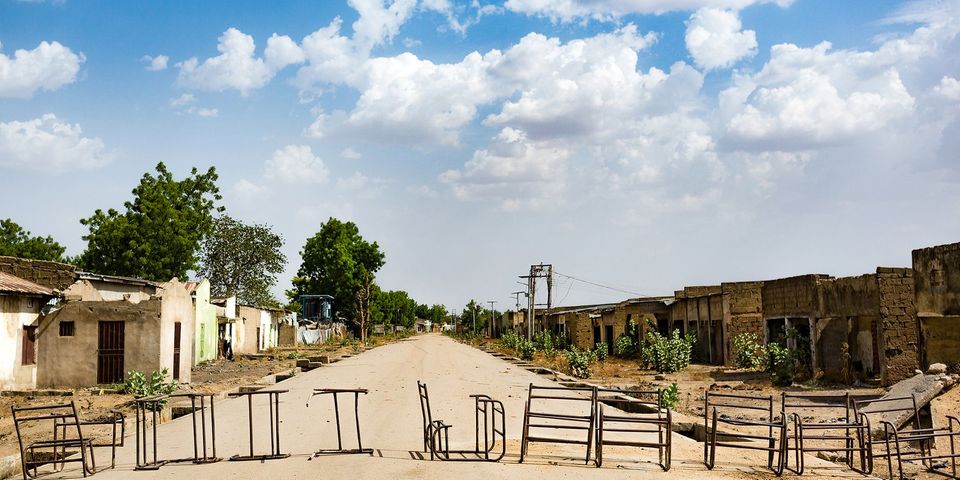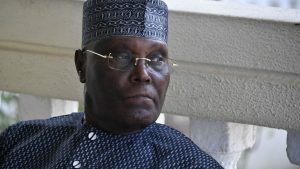Nigerian farmers struggle as climate change dries up water sources

Farmers in Nigeria are finding it increasingly difficult to get enough water for their crops. Riverbeds have started to run dry leading some to have no choice but to pump for groundwater. The finger is pointed firmly at climate change, with conservationists warning that food could become scarce if measures are not urgently put in place to help the farmers irrigate their land. STORYLINE: The ground is cracked and dry – once a lake and a river had been here.
These are the conditions for farmers in Nigeria and many believe climate change is to blame. After two decades of working his farm in north-western Nigeria, and struggling to find water for his crops, Nasiru Bello has no other option but to resort to pumping groundwater. A muddy puddle is all that remains of a river that had provided water for his over five-hectare farm and those of others in the Kwalkwalawa community in arid Sokoto state. “All these things are a result of climate change, because in the previous years we didn’t know the dryness of rivers like that but now due to climate change they are dry.
Surely, all the people around there, some of them counted the loss some years back when the rivers dried because they don’t have any means of irrigation apart from the river,” says Bello. He continues to plant his leeks in the dry earth. “I am facing a lot of difficulties because I’m not using the river,” he says. “It’s a well and sometimes you can dig a well but it dries up while you’re using it. You have to dig another one and to dig another is not easy because you have to spend money on any well that you are going to dig. And you don’t have the money to charge generators (to power the well) every year, you will be managing the ones you have until you get the money to buy another one. If you don’t, you will continue to manage it.”
Climate change is challenging agriculture in Nigeria, Africa’s most populous country. The decisions of farmers in the north, which accounts for about 70 per cent of Nigeria’s agriculture, are already affecting food prices and availability in the booming coastal south that’s home to the city of Lagos (with an estimated population of over 21 million people). Farmers say once-reliable water bodies are drying up.
And they have few resources to draw on. More than 80% of Nigeria’s farmers are smallholder farmers, who account for 90% of the country’s annual agricultural production. Some work their fields with little more than a piece of roughly carved wood and their bare hands. Maize, Nigeria’s largest cereal crop, saw a decline in cultivated land from 6.2 million hectares in 2021 to 5.8 million hectares in 2022, according to AFEX, a licensed private commodities exchange.
For years, Nigerians and others have taken note of the dramatic example of Lake Chad in the country’s northeast. It has shrunk by about 90%. There is little data available on the drying-up of other, smaller water bodies across the north. But farmers say the trend has been worsening. Elsewhere in Sokoto state, Umoru Muazu is tilling his farm to cultivate various crops without the certainty of a meaningful harvest. He says: “The year we started, we had enough water but now there is no water. Therefore, we have to dig a well in order to get water to continue to irrigate, except in the rainy season.
In the rainy season, we get water, but not now since the water withdrew, and before it didn’t dry as early as this, but now it does. We must dig a well to complete our work.” Nigeria is forecast to become the world’s third most populous nation by 2050, alongside the United States and after India and China. Experts are warning about the impacts of decreasing crop yields.
Dr. Isa Yusuf-Sokoto is an environmentalist from Sokoto’s Umaru Ali Shinkafi Polytechnic, he says: “The drying of rivers, lakes, streams in recent decades is associated to climate change that has come to stay. This is coupled with the precarious nature of Sokoto State being semi-arid region whereby desertification and other related climatic problems have been bedeviling the area. So this is why we’re battling with drought, which is the farmers are now complaining.”
Dr Yusuf-Sokoto explains how studies have shown that two-thirds of the trees across Sokoto are now gone, which contributes to rising temperatures. “If there is no intervention to farmers and this intervention has to be an emergency one,” he says. “There will virtually be a crisis, food crisis will occur, water crisis will also come up, and even health crisis can come up because all these are sons and daughters that could be given birth by climate change crisis.”
The decreasing farm yields are being felt elsewhere in Nigeria, especially in the south. Data from the government-run statistics agency show that local agriculture contributed 22% of Nigeria’s GDP in the second quarter of 2024, down from 25% in the previous quarter, while food imports reached their highest in five years.
With Nigeria’s population expected to reach 400 million by 2050, the U.N. Food and Agriculture Organization has been encouraging climate-smart agriculture to help ensure food security. Nigeria’s government has directed agricultural research institutes to develop solutions. That couldn’t come soon enough – for now farmers like Bello and Muazu continue to try cultivating in dry earth.
By Rédaction Africanews



